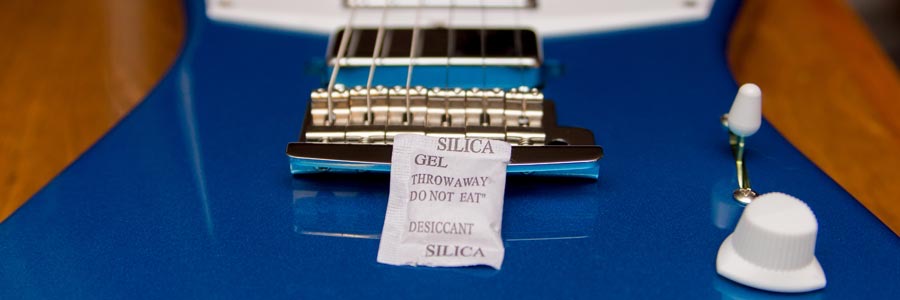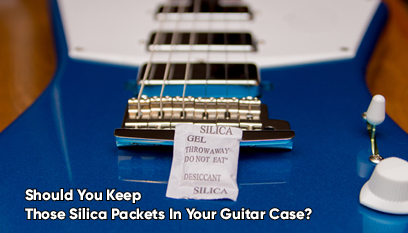
I asked my luthier friend, “What’s one thing you wish more people understood about maintaining their guitars?” His answer was surprisingly simple: Get those silica packets out of your guitar case! They will draw out moisture and cause significant damage to your guitar over time. I shouldn’t have been surprised. This luthier friend (Scott Miller of Naked Guitar Repair and Stonewall Pickups) is always preaching about the effects of moisture and humidity, or lack thereof, on guitars.
I don’t think it would occur to most people to put silica packets in their guitar cases. But these packets come in new cases, so lots of people just assume they’re supposed to be there and never take them out. If you have a silica packet in your guitar case right now, stop reading this post and throw the silica packet away now!
Is there ever a good reason to put a silica pack in your guitar case?
The only time you should put silica packs in your case is if it gets wet. When my basement flooded and my cases got wet the way I was able to save the cases was with a combined approach of leaving the cases open next to my dehumidifier and putting 6-10 packs of silica into the case.
Thankfully I was able to find reusable silica packs in bulk, like these, on Amazon. Gun owners are usually the main purchasers of these packs for keeping ammunition dry.
What’s in Those Packets, Anyway?
Silica packets are desiccants, which is a fancy word for “makes things around it dry.” (The clay in cat litter is another desiccant you might have in your house.) The packets come in two forms: sand-like granules or small beads. Either way, the point of these packets is to trap moisture. Anything that condensation and moisture can ruin may come with silica packets. You’ll often find them in new shoes, electronics, bottles of vitamins, and even beef jerky! Silica gel packs come in guitar cases to keep moisture away during shipping. Who knows what sorts of environments your guitar case will encounter during its long journey from the factory to your house? The silica helps the case cope with wild swings in temperature and humidity, so it arrives in good condition. The silica packs are NOT meant to stay in your guitar case once you have purchased it. Silica is nothing but bad news for your instrument if it stays.
Anything made out of wood needs a certain amount of moisture to function properly — otherwise you can get cracking, shrinking, waves in the finish, and basically a huge mess. The frets on a dried-out guitar can become sharp, because the fretboard shrinks but the metal doesn’t.
Fixing these problems can be a big job. Sometimes the damage is so severe, the guitar can’t be saved. It’s sad to see a nice guitar ruined because somebody didn’t pay enough attention to moisture and humidity.
Are Silica Gel Packets Dangerous?
You might wonder why would people put silica packets in guitar cases if they’re poisonous. After all, they say “DO NOT EAT” on them. (Not that an adult would be tempted to eat them… I guess they could possibly look like those little packets of black pepper that restaurants have..?) Silica gel packets aren’t actually poisonous, though. That warning is just trying to tell you, “This isn’t food.” It doesn’t mean, “Eating this might kill you.”
If you’ve ever Googled silica, you may have seen a serious disease called silicosis mentioned. It’s important to understand that people get silicosis from inhaling the dust of crystalline silicon dioxide. Silicon dioxide is basically sand, and it’s found in drywall and other construction materials. The silica that’s in the packets is synthetic, so it’s not the same thing at all! Children and animals sometimes swallow the entire packet and choke, which is the only way in which the packets can be considered hazardous. Since I have young kids and a dog at my house, I don’t keep silica packs around.
What happens if someone in your household does eat a silica packet? You should call your local Poison Control Center if you’re worried, but rest assured that these packets are non-toxic. It’s not like the little beads will swell up in your dog’s stomach or anything like that. There are likely MUCH more dangerous substances in your garage than a couple of silica packets! Note that most silica packs are white or clear. If you have the blue kind, those ARE toxic. They have an additional chemical (cobalt chloride) to make them change from blue to pink when they fill up with moisture. You definitely shouldn’t eat the colored ones or use them around food. Opening the packet and touching the stuff inside can cause some irritation. Remember that the point of silica is to dry things out, so it can dry the skin and eyes as well. If you tried to eat the contents, you would probably get the worst case of dry mouth in history, but that’s about it.
Do Silica Packets Have Any Other Uses in the Home?
Silica gel packets are not useless. Lots of people keep them around the house for various purposes. For instance, you could use them in your garage or basement to keep moisture away from scrapbooks, important records, old books, and holiday decorations. You can also keep silica gel packets in a toolbox or tackle box, to prevent metal stuff like nails and fishing hooks from getting rusty, or in a jewelry box, to keep silver from tarnishing.
Silica packets can even help absorb sweat so your gym bag doesn’t stink! The internet is full of people claiming that they saved their wet cellphones using silica packets and rice! Hey, it’s worth a try.
Keeping Your Guitar Properly Humidified
Okay, back to guitars… We now know that you should NOT keep the silica gel packets in your guitar case. But what else should you be doing to make sure that your guitar is kept in ideal conditions? Scott recommends getting a digital hygrometer, like people use with cigars. This device measures the humidity of your space. For an acoustic guitar the humidity should be around 40-60%, although the ideal is in the middle of that range. Here in New England, indoor humidity during the winter is routinely under 20%. Not good! If your hygrometer tells you that your humidity level needs improvement, you have several options:
- Room humidifier
- Soundhole humidifier (for acoustic guitars)
- Room dehumidifier (if your guitar spends a lot of time in a damp basement)
Some humidifiers actually allow you to set a target humidity range, which would eliminate the need to buy a hygrometer — for that room, anyway. The tech-obsessed can even have humidity warnings sent to their phone via Bluetooth using the D’Addario Humiditrak. Remember that room humidifiers need to be filled with water, and dehumidifiers need to be emptied. They’re not things you can just set up once and forget about. Additionally, if you do put a humidifier in your acoustic guitar sound hole, DO NOT leave it outside in direct sunlight or near a significant heat source like a wood stove! The heat buildup could cause the water to turn to steam, significantly damaging to your instrument. Humidifiers also need to be cleaned regularly or they get really gross! Don’t buy one without making sure it’s easy to clean. Avoid models with hard-to-reach areas, because mold will set up camp and drive you crazy. If your humidifier has a filter, that needs to be changed periodically too.
Another option is to simply store the guitar somewhere else. If you have rooms in your house that naturally maintain a fairly stable humidity and temperature, these are great rooms for your guitars. Sunrooms and screened porches are obviously not good choices.
Conclusion
No, you should absolutely NOT keep silica packets in your guitar case! Your guitar needs to maintain the proper moisture balance to stay in good playable condition.

